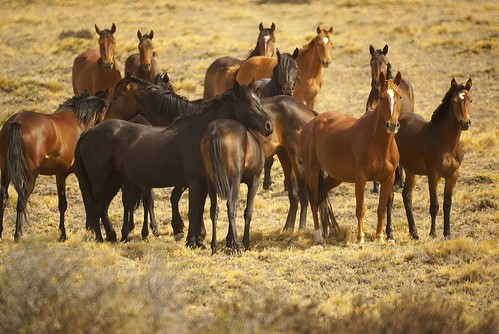Many people-- even those who are vegetarian and opposed to animal testing-- often strongly defend trail-riding and commercial horse-back riding as being fair and humane. This is a very misleading opinion, however, as I am about to show:
- The horse's physiological makeup was not built to withstand an extra 100-200 pounds, rider and tack, on their back, says Cherry Hill in her book How To Think Like a Horse. The only reason that humans can ride is due to the position of certain ligaments and muscles, but, in my opinion, by no means will the horse be comfortable with it. (Update: I know that Cherry Hill is not advocating against trail-riding in this quote. I am merely drawing logical conclusions based on the facts.)
- Commercial riding centres do not let their horses roam free; instead, they are kept penned in "standing stalls" that do not allow the horse to turn around. Often the horses only see daylight when they are being ridden.
- Animals, quite plainly, were not put here on earth for humans to use as their tools. Says Saba Alemayehu on all-creatures.org, "I always tell to pony riders and police men/women not to ride the animals needlessly, but some of them think it is something that the animals themselves enjoy to do, which is a lie. Every animal hates being manipulated, exploited, and being made an instrument..."
- The "tack" that horses are forced to don is anything but humane. Nobody should kid themselves that horses like to have such a painful bit (piece of metal invented for "steering" the horse) in their mouths that they become desensitized to the pain and need a stronger one.
- Neither should we try to believe that it's okay to whip horses in order to make them go faster. I learned this at a March Break riding camp I attended years ago. The riding instructor had a long whip that she would wave near the poor horses' legs to keep them going. I wasn't sure that it was a whip at first, but the terrorized neighs and startled eyes of the horses confirmed my guess. I was riding a horse who wasn't going as fast as the others, so the instructor handed me a short piece of leather.
"Here, use this," she said."What do I do with it?" I asked nervously.
"You-- er-- tap your horse's side."I very gently "tapped" my horse's side, but nothing changed.
"Harder!" she said.I hit the horse with a bit more force, but decided that I shouldn't do any more than that. Why would I hurt my horse?
"Come on," she exclaimed. "Horses are big, tough animals-- they won't be able to feel a little hit on their sides!"
She managed to bully me into hitting my poor horse even harder-- remember that I was still pretty young and easily intimidated-- but needless to say, I never went back to a riding stable again!
- Horse stables very often support conventional breeding practices-- that is, forcing the two horses together. They do this so that the stallion won't hurt the mare, but really, such breeding is one of the worst kinds of abuse that there is!
- Horses may become exhausted from overworking and providing one ride after another... for days on end.

vs.

It's up to you to stop supporting these cruel practices. Firstly, don't go to a trail-riding place yourself. This may mean turning down an invitation from your friends, but it's worth turning them down for once. Secondly, try to explain to people why not to go horse-back riding-- you can tell your friends, parents, grandparents, children (if you have any), teachers, colleagues, etc. Third, spread the word via social networking sites, blogs, posters, etc. The first three people who send an anti-horseback-riding poster that they made to:
get their creations posted on The Animal Rights Action Site next week!
What about bareback riding rescued horses? That's a slightly different story. If you have rescued a pony or horse, riding her must be consentual-- she mustn't refuse, run away, or flatten her ears. Teaching your horse to live in harmony with you is one thing. Forcing your horse to be ridden on the false premise that "he'll like it after a while" or "it's good for him" is another. If you really want your horse to want to be ridden, you'll have to build a close relationship with him first.


